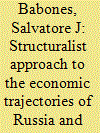| Srl | Item |
| 1 |
ID:
106770


|
|
|
|
|
| Publication |
2011.
|
| Summary/Abstract |
This article examines the post-Cold War transformation of defence industries in six East-Central European (ECE) countries, all former members of the Warsaw Pact and now members of the European Union and NATO. In the past, the arms industry was one of the pillars of the region's economic and political systems. In the past twenty years the region has gone through a profound transformation that brought fundamental changes in its defence industry. After painful adjustment a renewed arms sector, which is partially integrated into today's global arms production system, emerged. Although its size and prominence declined everywhere, this comparison reveals two distinct regional models, illustrated here by the Polish and Hungarian experiences. In Poland and similar countries the crucial importance of the defence industry was confirmed, whereas in Hungary and similar countries the industry's role has eroded. The ECE experience highlights the crucial role that defence industrial policy still plays in the sector's development. But the article also concludes that arms industry policy is not a suitable tool for national economic policy or management of economic crises.
|
|
|
|
|
|
|
|
|
|
|
|
|
|
|
|
| 2 |
ID:
152541


|
|
|
|
|
| Summary/Abstract |
Since taking office in November 2015, Poland’s conservative government has pressed for a sweeping reinterpretation of the past, and a re-envisioning of the future, of the political community. This conservative identity project idealises the allegedly fully sovereign Poland of the interwar period and repudiates the normative commitments underpinning Poland’s accession to the European Union. The worldview of the conservative government’s liberal critics, by contrast, represents a fusion of the inclusive nationalism asserted in opposition to communist rule with the affirmation of a European identity. The reawakening of historically resonant debates about the nature of Poland’s European-ness, emphasizing the centrality of the (Western) European ‘other’ in Poland’s national idea, carries significant implications for its relations within the international environment.
|
|
|
|
|
|
|
|
|
|
|
|
|
|
|
|
| 3 |
ID:
151559


|
|
|
|
|
| Summary/Abstract |
In Hungary and Poland, populist leaders with authoritarian tendencies have drawn on the cynical power-holding playbooks of the old communist regimes whose traces they vowed to erase.
|
|
|
|
|
|
|
|
|
|
|
|
|
|
|
|
| 4 |
ID:
123701


|
|
|
|
|
| Publication |
2013.
|
| Summary/Abstract |
I introduce geographical specificity to world-systems concepts of core and periphery to develop a structuralist approach on semiperipheral development in the world-economy. I apply this approach to the historical trajectory of economic growth in Russia and east-central Europe since 1900. I find circumstantial support for Wallerstein's classic assertion that mercantilist semi-withdrawal is a potentially effective development strategy for semiperipheral countries and show that Russia raised its economic output above historical trend levels during the Soviet period. In contrast, east-central Europe fell short of historical trends during the Soviet period, suggesting that Russia's gains may have been made at the expense of its satellite empire. With the end of communism, both Russia and the countries of east-central Europe quickly returned to their long-term historical output levels relative to the core countries of western Europe.
|
|
|
|
|
|
|
|
|
|
|
|
|
|
|
|